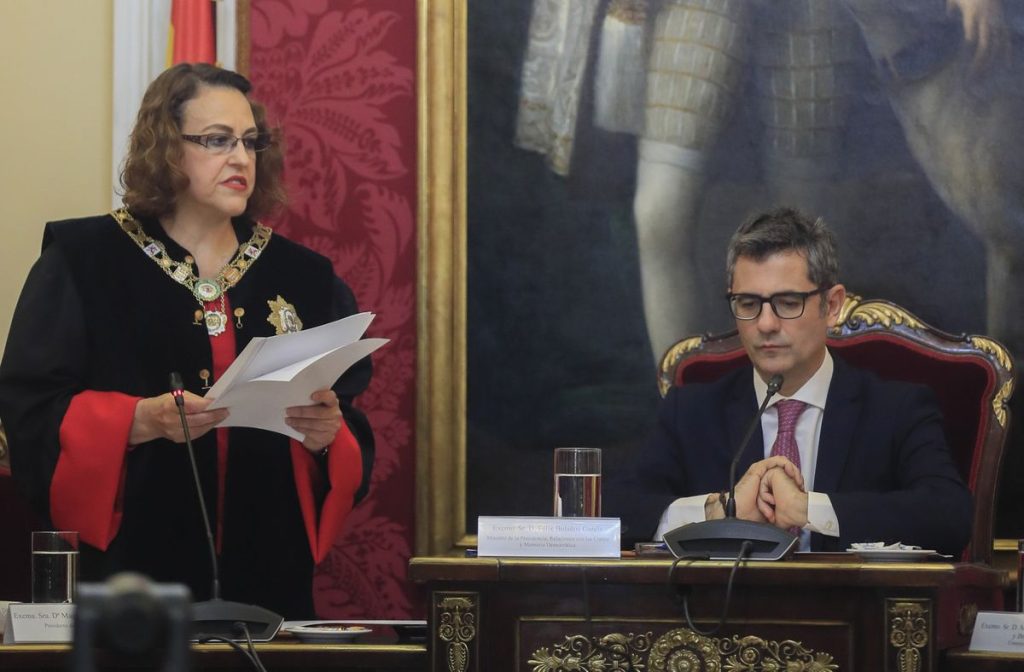The government has filed a request for relief with the Constitutional Court to have the Supreme Court’s ruling that removed former President of the Council of State Magdalena Valerio from her position annulled, as it deemed she did not meet the requirement of being recognized as a prestigious jurist. The Executive considers that the Hay Derecho Foundation, which challenged Valerio’s appointment, lacked legitimacy to appeal her nomination. The government’s appeal supports the relief request made by Valerio herself, who has also gone to the Constitutional Court, arguing that the Supreme Court is not competent to question her legal prestige. The government’s challenge does not address this issue and focuses on questioning the role played by the Hay Derecho Foundation as a party authorized to seek the annulment of Valerio’s appointment as president of the government’s highest advisory body in 2022. Before assuming this role, Valerio served as Minister of Social Security from 2018 to 2020. The State Attorney’s Office believes that the improper involvement of this foundation left Valerio “defenseless”, thus violating the Constitution. Therefore, it requests the Constitutional Court to “declare the nullity” of the Supreme Court’s ruling and clarify in its decision the doctrine on who and under what conditions may challenge government appointments before the courts. Following the annulment of Valerio’s appointment, the government has appointed former Vice President Carmen Calvo to this position.
Valerio’s argument goes further and emphasizes that her appointment was endorsed by Congress in a report that could only be challenged before the Constitutional Court. She also warns that her case sets a dangerous precedent. “If legitimacy is granted to the Hay Derecho Foundation or any other foundation or association among the thousands in Spain claiming to defend the rule of law to challenge the appointment by the Council of Ministers of the presidency of the Council of State,” the appeal states, “how can these private entities be disputed legitimacy to challenge the appointments of vice presidents, ministers and senior officials or any other discretionary political acts of public administrations?” Both the State Attorney’s Office and Valerio consider the relief requested in this case to have clear constitutional relevance. The government specifically requests the guarantees body to issue a judgment declaring the “violation of the State’s right to effective judicial protection as a party to the proceedings, causing irreversible harm by admitting an unconstitutional legitimacy contrary to a process with all guarantees, causing defenselessness.” Valerio’s appeal also emphasizes that the notion of legal prestige constitutes an “indeterminate legal concept” and that the “political nature” of the position for which she was proposed and appointed explains the “prevalence” of the “candidate’s experience in state affairs,” which she fulfilled as a former deputy and former Minister of Labor.
Valerio’s defense, led by lawyer Rafael Mateu of the Ramón y Cajal firm, argues that the requirements for any discretionary appointment are “honorability, absence of conflicts of interest,” and “competence.” “It is not just prestige, but also experience and management ability,” it adds. Regarding the latter condition, it explains that managerial competence is “key” to presiding over a body like the Council of State. It also insists that the “positive verification of suitability” carried out by Congress “is not a mere formality, as surprisingly alleged by the Hay Derecho Foundation, nor an ancillary aspect of the appointment process as the Supreme Court seems to understand.” The challenge to Valerio highlights that “the discretion involved in the appointment of a political officeholder or senior official by the Council of Ministers has already been duly and sufficiently controlled by Congress and it is not the Supreme Court’s competence to take on this review,” consider the Supreme Court has done by annulling Valerio’s appointment, a decision the appeal deems “forbidden” to said tribunal. The issue at stake, according to the relief request, is “nothing more or less than the relationships and balance between the major powers of the state and the immunity of decisions taken by Parliament, which are only reviewable by constitutional justice,” that is, by the guarantees body.
Valerio’s challenge ultimately states that the denial of her suitability to preside over the Council of State has resulted in a violation of her right to effective judicial protection, a right to a fair trial, and the right to defense. It adds that the Supreme Court’s ruling annulling her appointment represents “entering uncharted territory” and “a leap into the void” that demonstrates a disagreement with “the reasons for Valerio’s appointment,” thereby denying her the right to access public office on equal terms, as proclaimed in Article 23 of the Constitution.


